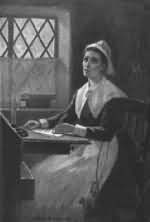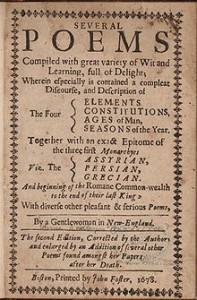Couplets for Mistress Bradstreet?!
BY Annie Finch

"Heroic couplets?," my husband Glen asked in astonishment. "Why are you writing in heroic couplets?"
Well, I answered him, half-wondering, again, the same thing myself, "It's a long story. . ."
Glen knows that it's been a point of passion, if not pride, with me for decades to write in meters other than iambic pentameter. What he might not remember is that when we were first married and I was struggling to maintain my identity within the free-verse-monopoly 1980s MFA world, the way I knew I was serious about meter was that deep in my wild, feminist, experimental, progressive heart, when I was honest with myself, I discovered a deep jealousy of . . . Alexander Pope.
No wonder I have never yet written in heroic couplets.
And now I'm musing on chiasmus and parallelism.
It's all Anne Bradstreet's fault--or Charlotte Gordon's, to be exact. When I read Gordon's biography of America's first published poet last summer, I was so moved by Bradstreet's story—the eight children and the deep faith, the brewing and the cheesemaking, the pioneering isolation and the brilliance—that I vowed to write her an elegy. I think she would have liked that: during her life, she wrote so many elegies for others, and yet so far I haven't been able to find a single one written for her.
When I start a new poem on a particular theme, my first creative challenge is usually the choice of a form that will satisfy my Muse--one that will inspire me with opaque physical resistance and also open a path between past and future. After a while I settled on one of my favorite meters, a shortish dacytlic line, combined with the rhyme scheme of Bradstreet's "Contemplations." The effect was pretty—lyrical and rather breathless—and that was the problem. It just didn't have the dignity I felt she would want.
Then I had a chance encounter at the AWP bookfair with critic David Caplan, who mentioned that he was writing an essay about how contemporary poets don't write in heroic couplets. My contrarian nature surfaced instantly and I heard myself promising him, "I take that as a dare, and I'll write you some." And when synchronicity emailed a few weeks later in the form of an editor actually wanting a poem about Bradstreet, so that I couldn't put it off anymore, it was time to succumb to the forces of the universe and put ten and ten, syllables that is, together.
It took a while, but I know it's what Bradstreet would have wanted for her elegy. She clearly thought of the heroic couplet as the most dignified form of verse, using it for elegies for her revered father and Queen Elizabeth. With hindsight, I don't know how I could have even considered using another form.
I won't say there isn't a lot of baggage involved in this choice for me. As Glen can testify, every level of my being has been working for decades on behalf of "metrical diversity," to use a term of my own invention. But I'm doing this for Anne. I'm breathing deep and letting the words flow in the wave of this discipline of meaning, this rhythm of thought, to honor her and to feel a bit of what she felt. After all, true diversity can't turn its back even on the most hegemonic entity, or it will end up only mimicking the limitations of its oppressor.
Deep inhale.
And exhale. A couple of weeks after making my choice, as if in confirmation, I was suddenly being invited by Walter Skold of the Dead Poets Society of America to be part of a reading at Bradstreet's grave next fall for Dead Poets Day.
I guess I know what I'll be reading. The spirits seem to believe there is a time and a place even for the heroic couplet, so I suppose they'll see me through.

Annie Finch is a poet, translator, cultural critic, and performance artist. She is the author of seven...
Read Full Biography

